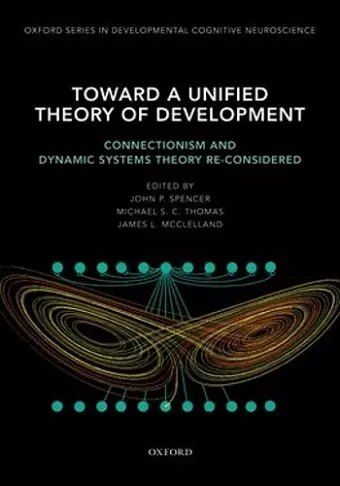Toward a Unified Theory of Development
Connectionism and Dynamic System Theory Re-Considered
Format:Hardback
Publisher:Oxford University Press Inc
Published:11th Jun '09
Currently unavailable, and unfortunately no date known when it will be back

This book offers insights into child development, exploring key theories and their implications for understanding growth from infancy to adulthood in Toward a Unified Theory of Development.
In Toward a Unified Theory of Development, the authors explore the intricate journey of human development from infancy through adulthood. They delve into the age-old questions that have intrigued scholars and parents alike: Is development a continuous process or does it occur in distinct stages? What role do learning and biological maturation play in shaping a child's growth? This book offers a comprehensive examination of these fundamental issues, providing insights that influence parenting styles, educational policies, and societal norms.
The authors, Spencer, Thomas, and McClelland, present two prominent theoretical frameworks within developmental science: connectionism and dynamical systems theory. Each chapter serves as a gateway to understanding these approaches, featuring critical evaluations and case studies that range from early motor skills to language acquisition. The book emphasizes the importance of these theories in understanding developmental processes, making it a vital resource for both academics and practitioners in the field.
Additionally, Toward a Unified Theory of Development includes commentaries from leading scholars, offering diverse perspectives on the theories discussed. By integrating advances in neuroscience and computational modeling, the book sheds light on how these modern ideas can enhance our understanding of developmental science, ultimately providing a clearer picture of the mechanisms that drive change throughout the human lifespan.
"What is knowledge and how is it acquired? Radical answers to these questions are proposed by the world's leading exponents of dynamical systems theory and connectionist modeling. The volume represents the first comprehensive review of the theoretical relationship between these two frameworks for understanding development. Readers will gain a thorough appreciation of the complementary nature of connectionism and dynamical systems, and receive guidance on how they might be unified in the service of a grand theory. If you are interested in the mechanisms of developmental change, you ignore this book at your peril." --Kim Plunkett, Professor of Cognitive Neuroscience, University of Oxford "There is no more complex construction project on earth than the development of the human brain. This integrated collection of chapters offers a new perspective on how development manages to accomplish the seemingly conflicting goals of maintaining stability while orchestrating massive changes as the brain grows into a human mind." --Terrence Sejnowski, Salk Institute for Biological Studies and University of California, San Diego "There are many good reasons for presuming that a theory of development should guide inquiry into perception, action and cognition. Unfortunately no developmental theory of the requisite scope and depth has been forthcoming. In the present volume we are given the opportunity to evaluate whether the desired level of theory could emerge from the perspectives of connectionism and dynamical systems, singly or in combination. Minimally, the volume makes us acutely aware of the challenges confronting efforts to formalize human development." --Michael Turvey, Board of Trustees' Distinguished Professor Emeritus, Department of Psychology, University of Connecticut and Senior Research Scientist, Haskins Laboratories
ISBN: 9780195300598
Dimensions: 183mm x 254mm x 28mm
Weight: 1202g
416 pages